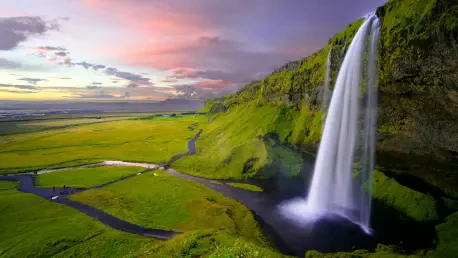In the ever-expanding field of sustainable travel, Iceland has emerged as a pioneering force, setting a compelling example for ecotourism worldwide. The nation’s innovative strategies have earned it a reputation as a leader in promoting environmentally responsible tourism. This exploration of Iceland’s sustainable tourism initiatives examines how the country effectively balances environmental stewardship with growing tourist numbers. With breathtaking yet fragile landscapes, Iceland stands as a testament to the positive impact of eco-friendly policies and practices.
Iceland’s Role in Sustainable Travel
Iceland as a Pioneer
Iceland serves as a beacon of sustainable tourism, showcasing its commitment to preserving natural wonders while accommodating a booming tourist sector. The country’s dramatic scenery, from glaciers to geothermal springs, draws tourists globally yet carries an intrinsic obligation to maintain ecological balance. Iceland’s strategic approach involves stringent measures to protect these landscapes, mitigating the potential environmental impacts of increased tourism. Its innovative initiatives not only prioritize conservation but also inspire other countries to adopt similar practices for sustainable travel.
Beyond its natural beauty, Iceland’s strategic initiatives are positioned at the forefront of global sustainability discussions. By promoting ecotourism, Iceland has developed models that prioritize the long-term health of its natural resources. Implementing strategies like controlled visitor access to sensitive sites and leveraging local expertise for conservation efforts reflects a deeply-rooted commitment to sustainability. As such, Iceland not only draws travelers seeking natural splendor but also embodies responsible tourism practices that ensure its landscapes remain pristine for future generations.
The Necessity of Eco-Friendly Tourism
The urgent necessity for sustainable tourism becomes especially apparent against the backdrop of the environmental toll inflicted by mass tourism. Iceland’s ecosystems, characterized by unique geological features and delicate biodiversity, are particularly vulnerable to degradation if not carefully managed. The Icelandic approach emphasizes sustainable practices as crucial measures to prevent such adverse effects. By adopting comprehensive initiatives prioritizing ecological health, Iceland demonstrates how responsible tourism can flourish amid increasing visitor numbers.
The imperative for sustainable tourism extends beyond Iceland’s national borders, resonating within the global travel landscape. The country exemplifies the notion that eco-friendly tourism is a necessity, rather than a passing trend. As climate change and environmental concerns grow globally, Iceland’s emphasis on sustainability becomes even more relevant, offering a robust framework for other nations. Through its proactive stance, Iceland illustrates the feasibility and importance of aligning tourism with environmental preservation—a model that encourages worldwide adoption for the benefit of the planet.
Strategic Government Policies
Ambitious Policy Frameworks
Iceland’s sustainability achievements are underpinned by strong government policy frameworks that align economic growth with environmental preservation. Key initiatives, such as the Green Steps Program and the Climate Action Plan, showcase the government’s dedication to fostering eco-friendly practices across various industries. These policies not only aim for carbon neutrality by 2040 but also set ambitious goals such as eradicating fossil fuel reliance by 2050. This alignment of ecological and economic ambitions presents a cohesive national strategy for sustainable tourism.
These policies serve as a foundation for Iceland’s comprehensive approach, integrating sustainability into every aspect of its development. By investing in renewable energy sources and enhancing waste management systems, Iceland exemplifies a visionary approach where long-term environmental health is a priority. The profound impact of these policies is evident in the robust and resilient frameworks developed, offering a roadmap for other nations seeking to balance tourism growth with environmental stewardship. Iceland’s commitment highlights the possibilities for harmonious coexistence between development and conservation.
Role of Leadership
The pivotal role of leadership in advancing Iceland’s sustainability agenda cannot be understated. President Halla Tomasdottir’s advocacy for environmental sustainability underscores the national ethos of prioritizing ecological balance alongside economic objectives. This leadership perspective is integral, fostering environments that encourage sustainable practices and instill a culture of responsibility in both public and private sectors. Such visionary leadership aligns the entire nation towards shared goals of environmental preservation and economic success.
By championing these values, Iceland’s leadership sets a precedence in acknowledging the urgent need for sustainable tourism models. The emphasis is placed on pursuing profit while preventing environmental harm, advocating that economic aspirations should not overshadow ecological considerations. This stance is crucial in galvanizing collective action across industries and communities, illustrating how leadership can effectively guide national priorities. Consequently, Iceland stands as a model for leadership-driven initiatives, promoting a sustainable tourism industry committed to both growth and conservation.
Sustainability Across Sectors
Transportation Innovation
Transportation stands as a core component of Iceland’s sustainability efforts, with significant strides made in eco-friendly public transit solutions. Reykjavik spearheads these initiatives by integrating hydrogen-powered and electric buses, reducing carbon emissions from urban travel. The government’s commitment to expanding a well-connected network of EV charging stations further complements these efforts, encouraging the adoption of electric vehicles by both residents and tourists, thus fostering cleaner and more efficient travel.
The national airline, Icelandair, mirrors these sustainable efforts by investing in alternative aviation fuels and carbon offset initiatives. These measures aim to minimize the airline’s carbon footprint, presenting a holistic approach for sustainable aviation. Through such comprehensive transportation strategies, Iceland demonstrates an unwavering dedication to reducing emissions on multiple fronts. These innovative solutions not only contribute to environmental goals but also serve as practical examples for other countries seeking to enhance their public transportation systems while committing to sustainability.
Hospitality and Accommodation
The hospitality and accommodation sector in Iceland has embraced sustainable innovations that align with the country’s environmental goals. Many Icelandic hotels employ geothermal heating systems, significantly lowering carbon emissions associated with energy consumption. This sustainable approach extends further, with establishments incorporating waste reduction strategies and utilizing locally-sourced materials, thereby reducing the overall environmental impact of their operations.
Furthermore, the rise of eco-friendly Tesla campers offers tourists a sustainable way to explore Iceland’s vast landscapes. These options are favored for their minimal impact on the environment, providing off-grid experiences that emphasize a connection with nature. Such accommodations reflect a broader trend within the sector, catering to the growing demand for eco-conscious travel options. By leading with these practices, Iceland’s hospitality industry not only enhances tourists’ experiences but also embeds sustainability at the core of its offerings, reinforcing the country’s commitment to eco-friendly travel advancements.
Supportive Practices and Education
Certification and Accountability
Certification programs and accountability measures are crucial in fostering a sustainable tourism culture in Iceland. The Vakinn certification, which rewards businesses meeting high environmental standards, is pivotal in encouraging responsible practices within the industry. By acknowledging companies that adhere to sustainable operations, this program promotes a culture of accountability and excellence. It ensures that tourism services align with the nation’s ecological priorities, playing an essential role in advancing sustainable tourism models.
Iceland’s robust environmental laws, such as those prohibiting off-road driving in sensitive areas, further exemplify its commitment to ecosystem preservation. These regulations are vital in ensuring the protection of Iceland’s natural reserves, preventing potential damage from tourist activities. Through stringent enforcement, the country demonstrates that sustainability and respect for nature are non-negotiable values within its tourism sector. Such measures illustrate the significance of strong governance and accountability in upholding environmental standards, serving as a reference point for other nations seeking to enhance their tourism policies.
Local Sourcing in Culinary Enterprises
In the vast realm of sustainable travel, Iceland has established itself as a leading beacon, offering a model for ecotourism that the world is increasingly keen to emulate. With its awe-inspiring, yet delicate, natural wonders, the country has made notable advancements in implementing forward-thinking strategies that emphasize the importance of balancing the environment with the influx of tourists. Iceland’s commitment to eco-conscious tourism is setting new standards, showcasing the potential of sustainable practices to protect and enhance natural landscapes. By prioritizing the conservation of its unique ecosystems, Iceland demonstrates how tourism can coexist with environmental preservation. The nation is actively promoting various initiatives focused on reducing carbon footprints and encouraging responsible travel behavior. This dedication not only preserves the country’s natural beauty but also inspires global efforts towards more sustainable tourism practices, proving that environmental stewardship and tourism are not mutually exclusive but can thrive together.









